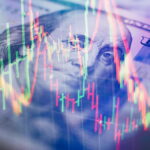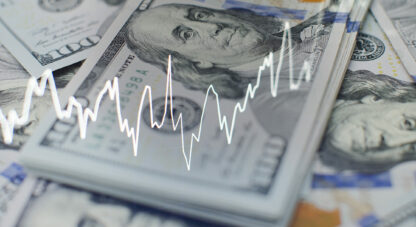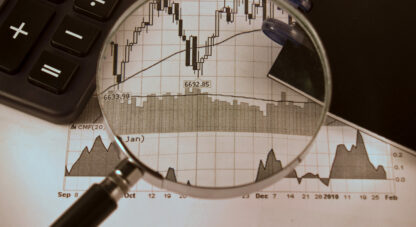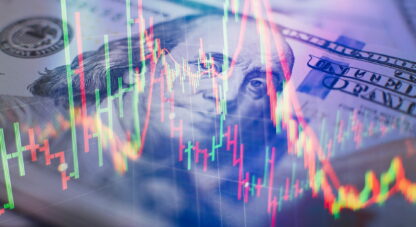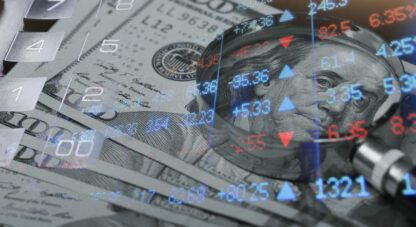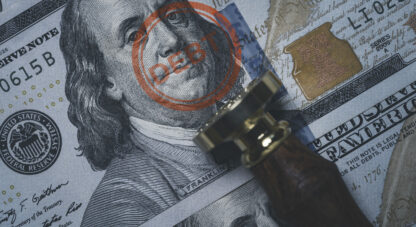The McAlvany Weekly Commentary
with David McAlvany and Kevin Orrick
“What’s the context? What I’m saying is that something is very, very rotten in the global economy, and we can pretend that somehow we’re immune to that. But again, I think, a word to the wise – the Fed told you everything you need to know. They see weakness, and they won’t talk about it, but their actions do speak louder than words.”
– David McAlvany
Kevin: Well, we got our answer on rates, Dave, and I know we can talk about that later, but actually, it may not be rates at all that stimulates the economy. Oil prices have been dropping so dramatically, it has to put some money in pockets that wasn’t there before.
David: Yes, I’d like to talk about a couple of things. Certainly, the rate issue is a critical one, but it has been critical to sort of a sense of normalcy going back seven, even nine years, since the last time we raised rates. But there are other things that are also very important. As you mentioned, oil is a major contributor to economic stimulation now, and they are now considering many, what would be considered for us, unconventional means of stimulating the economy – the old helicopter speech from Ben Bernanke.
Kevin: Right, just dropping cash from the air.
David: It is fascinating to me the number of unconventional methods that are being suggested in very conventional places, the Financial Times suggesting maybe Corbynomics where you just hand out money. This is Wolfgang Munchau this last week saying, “Hey, if you need to, just start writing checks for $5,000 to every man, woman and child in Europe.” We will get stimulation going and economic activity going, even if it means doing something as interesting, curious, in our view, as absurd as that.
Kevin: Well, and we can talk about this later, but obviously, they are going to have to force people to spend it instead of saving it, because stimulus in the economy doesn’t occur if people sock it away.
David: One of the things that has been on my mind of late is the changing face of the Middle East. We have renewed conflict on the Temple Mount here in the last few days, and that, in itself, is worth thinking about in terms of the region and potential exaggerations, if you will, of problems there. There is general insecurity in the region. That general insecurity went back to the month of July when a deal was struck, and we are moving away from having Iran kind of under our proverbial thumb.
Kevin: Right. When you’re Israeli, when you hear the word Iran come up, or the Iranian deal come up, what you are really hearing is the destruction of Israel.
David: And if you are the Saudi royal family you hear something else. You hear the destruction of oil monopoly.
Kevin: Exactly, the royal family’s monopoly.
David: So there is a great degree of tension there and the drop in oil is massively stimulative to the global economy over time, and here is how the numbers work out. You have 34 billion barrels of oil which are used every year – try to keep track of this – 34 billion barrels of oil used every year. Every decline of ten dollars reallocates 340 billion dollars from oil producers to oil consumers.
So here we have, not just a $10 drop, but a $60 drop in oil off of its recent peaks, and we have just witnessed, if these levels, if these prices hold for a year, what would, according to the Gavecal chief economist, two trillion dollars in reallocated funds, again, from the oil producers to oil consumers. And this includes, again, you are talking the Saudi royal family, you are talking many of your OPEC members which are very disturbed by this move lower. But it is, on the bright side, highly stimulative to the global economy, assuming that the dollars are spent, and not allocated toward sort of a reduction of debts, a “de-leveraging.”
Kevin: Which is what we have been seeing. Let’s face it, a lot of the quantitative easing dollars went to just really soften some of the impact of the debts that weren’t being paid. It might have been the banks, but still.
David: The trend for three or four decades has been a leveraging up to the point where credit growth is the key ingredient in economic growth, and ideally, of course, this is not how we would think. But in a credit-addicted global economy where savings are not critical any longer and they have been replaced as sort of a finance mechanism by shadow banking and the creation of fiat money, these are areas where, if the powers that be can expand them, they will do so, more or less on an unlimited basis. Now, ultimately, there is a cost to that, and here you have an oil subsidy which doesn’t have the same kinds of costs as a quantitative easing 1, 2, 3, in terms of a pressure that it puts on the currency.
Kevin: Let me ask you a question then, because you look at Russia, and Russia has to have much higher oil prices to be able to economically survive the way they have in the past. Does it matter? Let’s say oil drops to $10, $15, $20 a barrel in short order, but then comes back up, or is it this longstanding sort of low price in the $40 range that actually is more destructive?
David: The critical role of oil prices is not where they go, it is where they stay for any length of time. And so, cyclicality is expected with any commodity. But if the cyclical upswings take considerably longer to gain traction and a lower level, like we have now, is sustained for a longer period of time due to structural changes in the market, then again, you go back to the world of an OPEC monopoly, or of U.S. sensitivities and Mid East politics. These things begin to change pretty radically.
Kevin: If you think about it, our sensitivities to the Middle East change as we start to become more energy independent, and the price is low, but actually, their sensitivities toward us, this could be a geopolitical change, couldn’t it.
David: Yes, the decision to lift the Iranian sanctions, certainly, first of all, it has sort of the nuclear implications, and that is sort of an unknown variable, maybe a source of ongoing regional concern, but the more obvious impact is the return of Iranian oil production to the market. So you have the country with the fourth largest reserves in the world, and Iran has considerable room for increasing production. We already exist in a market where daily production of oil is greater than daily consumption of oil by about a million barrels a day, or if you are adding it up, 365 million barrels excess production per year.
Iran is targeting – the post sanctions target is to double their oil production from one million to two million barrels per day, and that is going to be, basically, overnight. Then their goal is to double it again by the end of the decade to four million barrels a day, which brings them back to the 1970s production level.
So again, basic math here, if you assume that U.S. production remains constant at these levels, even for two to four years before your major decline rates hit a critical level – and I think they will at some point – but for at least two to four years, if you are running a million barrels in excess production coupled with the three million barrels coming from Iran, that’s four million barrels per day in excess production. That is about a billion-and-a-half excess barrels a year.
Kevin: Isn’t it interesting, Dave, how quickly the markets started to react to the thought that maybe there was going to be a deal reached with Iran?
David: Well, that’s right. Anatole Kaletsky points this out, that the recent decline in the price of oil started around July 6th. That is within days of the deal to lift international sanctions in Iran. So the bottom line is that cheaper oil will, at some point in the future, shift power back to the marketplace, to allocate two trillion dollars where it wants to, where it will. And this is, I think, very helpful for the global economy, and certainly comes at a very needed timeframe. You are talking about households which are in the process of deleveraging, and you are talking about major import and export numbers, other indications of economic activity that are, at present, sliding toward the 2008-2009 crisis levels.
The consumer globally will experience some relief in the years ahead via this reduced cost, and I would expect that to begin to act as something of a tailwind in sort of the 2017-2018 timeframe. Again, what does this assume? It does assume that Brent and West Texas Intermediate, your main prices for crude oil, remain less than $50 through that kind of a timeframe. Again, because the point is, it is not where the price of oil goes, it is where it stays for any length of time that ends up changing the dynamics of the marketplace.
Kevin: Well, a concern that I have, Dave, from America’s perspective, is this. We have had a petro dollar monopoly, really, since the Bretton Woods agreement was signed. Franklin Roosevelt met with the Saudi royal family before he died, before the end of World War II, and the agreement was that we would buy our oil from the Middle East as long as they took the excess dollars that paid for that oil and turned around and loaned it back to us. Kissinger really sealed that deal up even sounder back in the early 1970s.
David: Yes, so it is not as helpful if you are the United States government. If you are the U.S. or global consumer, then lower oil prices sustained over a long period of time end up subsidizing consumption of other goods and services and/or paying off debts – you can choose how you want to spend the extra money, as it were. But if you are the United States government and you have been used to living off the Kissinger petrodollar dividend, let’s face it, less petrodollars translates into fewer gulf state buyers of U.S. treasury bonds and other dollar assets. That’s just real basic, connecting dots.
Kevin: Okay, let’s assume that we don’t have a geopolitical crisis that would change the price of oil. Why the delay in the excess spending money for the U.S. consumer? You said 2017-2018. Why wouldn’t it hit right now? The prices are low now.
David: Yes, well, I think the delay in oil prices benefits being passed on to the consumer, in the sort of 2017-2018 beneficial timeframe, I believe, is because of a greater distraction from the financial markets as they come under considerable pressure in the interim. And we already see it in consumer sentiment numbers. We talked about the University of Michigan numbers a few weeks ago.
Kevin: Very recessionary numbers.
David: Very recessionary numbers, a surprise to the downside, and I think as sentiment has shifted in the marketplace, you have a reason for people to tread more cautiously when it comes to spending.
Kevin: Well let me ask then, the lower oil prices, could we avoid a recession if people start spending this benefit right away?
David: No, I don’t think so because credit is not growing fast enough, and I mentioned that earlier, that we have this strange world in which credit growth is really the defining characteristic of economic growth and if we don’t have sufficient credit growth in a debt-dependent system then you end up easing into recession. So credit is not growing fast enough for the U.S. to avoid recession, and I think that’s an event that we see either late this year or early next. Couple that with the technical, sort of the internal cracks, if you will, whether it is breadth or volume, or what have you, in the stock market. I think those cracks are likely to widen.
Here recently, look, we had the Dow Theory sell signal last month. We also had what some analysts call a Death Cross where the 50-day moving average moves below the 200-day moving average – that was August 11th – followed by a fairly bad showing at the end of the month, to put it tamely. Not to mention the sort of famous “head and shoulders” top which Bloomberg was discussing as of September 21st. And it is this long-term top that is consistent with Louise Yamada’s call for entry into a long-term bear market.
Kevin: So people are hesitant right now to spend money.
David: I think they are hesitant to spend money. Consumer credit is not the largest portion of what you might see in terms of the major contribution to total credit expansion. And I suppose you could say, if it gets bad enough then the government will step in and step up its efforts again, à la QE 4 – we’ll get to that in a minute. I think, for the time being, caution and fear will predominate the markets, and should the indexes sort of languish where they are, move lower, let’s look at it this way. Even if they fail to put in new highs, if they attempt it again and just can’t get above the bar, I think, again, you have consumer sentiment, along with consumer spending, which will suffer in concert. In other words, you have the distractions of market chaos which will encourage the consumer to aggressively save those petrodollars rather than spend them.
Kevin: Well, I know a friend of yours, Bob Prechter, became quite famous back in 1987, because in 1987, before the crash of the stock market, he called it, and he called it virtually to the day. I remember reading the Wall Street Journal article. I didn’t know who he was, actually, to be honest with you, until that happened. Robert Prechter, at this point, Dave, I think he is telling you something that could possibly make everyone’s hair stand on end if he is correct.
David: If I am ever having a good day and I want to have a bad day, I will generally get Bob’s views on the market and it has a way of (laughs) concentrating one’s attention. Wonderful human being, love to visit with him, and we usually see each other this time of the year to discuss all things musical, philosophical, and market-related. Bob sort of sketched out a trifecta of bad news looking at a cyclical top from 2009, a super-cycle top from 1974, and a grand super-cycle top from 1932. Time will tell if Bob is right in the severity and length of the decline, which in his opinion would be, modestly put, years, up to two, two-and-a-half decades.
Kevin: So very long-term.
David: Very long-term decline, which is one of the reasons why he emphasizes cash, cash, and more cash. In that context, and in sort of the bad news bears camp, I would say that cheap oil is at least a small positive in that context. But again, as I say, sentiment is likely to remain negative with that fuel subsidy sort of gathering in bank accounts and improving the national savings rate as we get through 2016 and 2017.
Kevin: So you’re not as dark right now in prediction, long-term, as Bob Prechter is.
David: No, I think the oil subsidy serves to improve the household balance sheet. Corporate balance sheets may get ugly here in the next couple of years, and we may see the government balance sheet simply go to hell. But I think the one place that you might see some positive aspects, again, because of a lower oil price, if in fact it does stay at a low level for a sustained period, is that household balance sheets could improve. The good news/bad news is, when you look at credit expansion, household credit expansion is one of those elements that needs to expand, if in fact the economy is going to expand, as we understand the economy today as completely debt-addicted and debt-dependent. So yes, compared to Bob I remain more sanguine, certainly over the long-term, sort of a three, five, seven, ten-year stretch, but still with a sense that global financial markets, in the short run, are warming up for a 2008-2009 repeat.
Kevin: Which was no walk in the park.
David: No. You can set aside the technicals, come back to credit growth, if you want to keep that front of mind, and that is a key factor that Richard Duncan has routinely highlighted as a guest on the Commentary. If you don’t have 2% growth, net of inflation, 2% growth in credit…
Kevin: It’s our addiction.
David: Well, exactly. And this is not a healthy state to be in, it is just the way it is. But if you don’t have 2% credit growth, net of inflation, then you are sliding into recession. And we are on the cusp of that number right now. But we could come under that number very easily if inflation sort of bumped up, even to the slightest degree. And by the way, we have M1, we have M2, we have the monetary base, all of which are beginning to expand again. So there may be something of a minor, if not major, but at least a minor inflationary surprise, and again, that would drop us to a level that is below that 2% threshold in terms of credit growth, and I think you would find us in a recession, beginning to mid next year.
Kevin: Well, and you’ve said before, as America goes, so do the emerging markets go, and vice versa. Last week you talked about the danger that we are to the emerging markets, as far as the strength of the dollar, but the danger that the emerging markets are, actually, to our economy.
David: Yes, and it does go both ways. That is something we’ve highlighted for several months, the weakness in emerging markets, that there is this migration from the emerging markets, their weakness, and seeing that sort of move toward the developed markets in the United States, Europe, etc. And that is already occurring. And this, I think, is one of the key reasons why Yellen and company did not raise rates last week.
Kevin: The emerging markets?
David: Looking at the impact of a continually strengthening dollar. If the dollar continues to strengthen as a result of tightening of credit here in the United States, which would be dollar-positive, it means that it is negative for your emerging market currencies, and certainly, any emerging market – I mean, keep this is mind, we went from, say, two trillion dollars prior to the crisis, two trillion dollars in dollar-denominated debt held by emerging markets, to over seven-and-a-half trillion dollars, today, held by emerging markets.
And this is dollar-denominated debt, so the problem is you have that classic currency mismatch where both the financial sector, corporations, and governments were financing in dollar terms, and if the dollar continues to move higher in value vis-à-vis their currency, what happens? They may have financed in U.S. dollars because rates were cheap, but now they are having to pay more in absolute terms because of the currency exchange rate differential.
And so, if you want to crucify the emerging markets, allow the dollar to rise rapidly, and you will do just that. I think it was two years ago at one of the Jackson Hole meetings that one of the Fed chiefs – I think it may even have been Bernanke – basically said, “We really don’t care about what happens in the emerging markets, it’s really the U.S. that we’re concerned about.” You can’t be that glib, and I don’t think they are, in an interconnected globalized financial system. Things transmit cross-border. We have a problem, they feel it. They have a problem, we feel it.
Kevin: At the risk of sounding ignorant, Dave, if these guys still control things, and can continue to control things, I wonder if they will ever raise interest rates. Let’s face it, you have kids going into third grade – interest rates have been low since they were born.
David: Well, that’s right. So for all the rhetoric of recovery, you have rates that are still near zero, where they have rested for seven years. And in an even longer timeframe, if you are talking about an interest rate hike, we haven’t seen an increase in interest rates in nine years.
Kevin: That’s incredible.
David: It has been nine years since the U.S. economy has had to take an interest rate increase in stride.
Kevin: Hasn’t this been mainly to bail Wall Street out, not Main Street? I mean, this is for Wall Street and the banks.
David: Sure. And keep in mind what happens when you do move into a tightening cycle. 2004, a little bit rocky in the bond market. Before that, the last interest rate hike cycle was 1994. Yeah, a little rocky in the bond market. I think that’s when we lost Orange County – they went bankrupt, being on the wrong side of an interest rate trade. But you’re right, there is this extraordinary subsidy to Wall Street and the financial sector, and it extends to Washington, D.C. in a very self-serving way via significantly reduced interest costs on the national debt.
And cheap money is like an opiate. The question of whether the system can handle the shock of easy money withdrawals – that question is still on the table. The emerging market currency and bond weakness – what it suggests is that the global economy is dangerously weak, and I think the Fed, all-in, looked at this data, both international and domestic, and said, “Listen, we know our official statistics are a little bit overdone. Let’s just wait. Let’s just wait.”
Kevin: And let’s go back. Actually, we’re not just talking about Janet Yellen, here. Ben Bernanke was promising to raise rates before he left.
David: Never raised them, even though the labor market targets that he had set out basically said, we get to 6.2 on the unemployment number and we will raise rates. Janet has promised higher rates and has yet to raise them, ignoring the employment rate. Why? Listen, it could be the labor participation rate. We’ve talked about the fact that we have close to 93-95 million people who could be working and aren’t working, and that that labor participation rate is the worst we have seen in decades, which doesn’t exactly jive with a 5.1% to 5.2% unemployment rate.
Does that keep her up at night? I tend to think not. I think that the lack of inflation is what does keep her cohorts concerned because they believe that the only way to grow an economy, year in and year out, is using an inflationary stimulus. I have to tell you, philosophically, this drives me crazy. Let me change that. It’s not philosophically that that drives me crazy, it’s historically that that drives me crazy.
Kevin: Right.
David: Because you have to completely ignore the 19th century, and a good bit of the 20th century, to look and say to yourself, we need inflationary stimulus to grow the economy, year in and year out.
Kevin: Last night, Dave, you were talking about what the globalized world looked like, not now, not 50 years ago, 100 years ago, or 110 years ago. We had a globalized, relatively peaceful world when we were on a gold standard and inflation was virtually nonexistent.
David: One world currency.
Kevin: Yes, it was gold.
David: Gold is a one-world currency. We had free trade. We had an increase in productivity.
Kevin: We had no major wars from 1870 until about 1914.
David: And so there is this idea that somehow deflation is bad, and yet we spent, let’s say 120 years, in a deflationary environment with a booming global economy. Booming global economy for the better part of a century, over a century, in the context of deflation? And the current models tell us that the only way to grow an economy, year in and year out, is via tinkering by the Ph.D. class with the inflation statistic, that we should be fearful and afraid, we should be concerned, if we don’t get that 2% inflation.
Kevin: Let me ask, David. Okay, so they print money and it doesn’t create inflation, so they lower interest rates to zero and it doesn’t create inflation. At some point we are going to be paying them to save money. Isn’t that one of the things that they are looking at?
David: It was not a matter to be voted on, but at the last FOMC meeting there was actually the suggestion of taking rates negative by one of the members. And again, that is moving rates negative in nominal terms because if you take our current Fed funds rate and adjust it for inflation, we already have, in real terms, a negative rate.
Kevin: Dave, that’s like me putting money in a bank – let’s say I put 100 bucks in the bank and I pay the bank, let’s say, 2% a year, two bucks a year just to keep money in the bank.
David: That’s fine. I mean, that used to be done. The only time that that has ever been done in history, for good reason, was Chemical Bank. Remember, they used to call Chemical Bank “old bullion” because in the context of financial crisis you wanted to get in line to put your money in Chemical Bank? Why?
Kevin: Because they had gold backing to it.
David: Gold backing to every dollar, so you actually paid to have your money there, knowing that nothing bad could happen. There was nothing that could possibly happen of a negative nature, and therefore the guarantee of getting the return of your money versus return on your money, you would gladly pay for that privilege. The idea, in the modern context, of repressing interest rates, lowering them below zero as they have now done in Scandinavian countries, as they have done in Switzerland, as here somebody in the U.S. is suggesting at the last FOMC meeting – it is absurd, it is patently absurd, because we’re not talking about the solidity of “old bullion” we’re talking about the track record, since 1913, 102 years now, which is abysmal in terms of maintaining purchasing power.
Kevin: Back in the early 1980s I was an economics student, Dave, and I was taught exactly what you are talking about, that inflation is what everyone needs to gear toward, because it was the new Keynesian, or monetarist way. But we were also taught to fear deflation, and Bill King has said, “No, deflation actually helps the consumer.” But we’ve been taught, as economists, to fear deflation. Why?
David: Well, he goes on to say, it helps the consumer on a tax-free basis. When things get cheaper it’s the equivalent of getting a pay increase, but not paying any more in terms of taxes.
Kevin: You get more goods and you don’t pay more taxes.
David: Yes. When you have inflation in the system, it naturally boosts your tax revenues every year – every year. In the deflationary context the consumer gets a benefit, but doesn’t have to pay more in taxes thereby. So you think about the class warfare that is currently happening, and it really is class warfare between elites and the common man. And the common man would do well to do their own homework and demand something different – a paradigm shift of sorts, because the current paradigm is fleecing them, absolutely fleecing them.
You go back to the 1950s. By this time I think everyone knows who William McChesney Martin is, if you listen to the Commentary at all. In the 1950s he was the head of the Federal Reserve, and in the 1950s, as the lead man at the Fed, he considered inflation of any sort to be theft. He called it such. He didn’t mince words, he basically said it is a very quiet theft. Now we have 2% inflation as a staple of economic progress?
So theft is theft, or has something more fundamental shifted? And I think this is really, again, coming back to that notion of a paradigm shift, our basic assumptions about what drives the economy – that’s what we are talking about. That’s what we are talking about, something very, very basic. We need a radical shift way from contrived markets, contrived market prices, being determined by the Ph.D. crowed. I have nothing against smart people, I have nothing against smart ideas. But I do mind presumption, I do mind pride, I do mind overconfidence, because in most contexts these are the qualities that get you in big trouble.
Kevin: Richard Duncan has told us that unless was actually organically grow as an economy, credit has to grow. And what you have just now told me earlier was that credit is not growing quick enough to keep us out of a recession here in the next year.
David: Yes, so what do we think is going to stir an expansion of credit and remove the likelihood of an imminent recession? I don’t know. I don’t know. So I guess you could take it to the other extreme of, what if Robert Prechter is right, and instead of a mild contraction, a mild recession, we end up with a massive credit contraction and sort of a forced liquidation event in the debt markets, a massive contraction of credit which the government can’t get us out of either.
Kevin: What if they force us to spend?
David: Well, and I think this is where you go. Rather than saying, “Our models are failed,” the official discussion of forcing money out of the savings account mattress – that has already occurred, it has already happened. There is no doubt in the minds of central bankers that liquidity is the answer and they can create more if they need it. The silver bullet for all financial beasts is the expansion of credit, and now that there is not enough economic activity being driven by the liquidity that they have already created post crisis, rather than question the thesis of liquidity being a cure-all, what is the central planning crowd doing? They are suggesting that cash needs to be eliminated.
Kevin: So we are talking a cashless society?
David: Right. And basically, it’s the issue of, “We need to force all currency that is currently in the banking system, and literally in the mattresses, into the economy. And so we’re moving toward a different kind of stimulus and it is a new era where central banks use cattle prods to stimulate the hoarder, if you will, the saver, to penalize them and get that money out of the mattress.
Kevin: Well, you know, there is an interesting analogy that is occurring, Dave, because I’m noticing a change even in my own behavior. Instead of cash in the pocket to spend, or let’s say, giving a gift, let’s say it’s my mom’s birthday. My wife and I had the discussion, “Well, do we send cash this year and let her do what she wants to do? Or do we buy her an Amazon card, or a card to such and such, so that it forces her to spend on something that we want for her?”
David: A list of books that she has put in queue already.
Kevin: Exactly. But the thing is, the difference between cash and, say, an Amazon card, in a way that is sort of forced consumption, isn’t it? Because nobody saves money on Amazon Prime.
David: No, that’s true. There is a contradiction I want to mention, though, because it is odd that a cashless society and forced consumption are on the table for policy consideration at the same time that central banks are still paying interest on excess reserves in depository institutions.
Kevin: It shows there isn’t coordination in thought. There is a lack of clarity of what they are trying to do.
David: Something like an institutional blindness between bankers. “The problems, clearly, are not endemic to the banking community. The problems, clearly, are not endemic to the central bank or commercial banking entities. The problem must be with the hoi polloi. The problem must be with the man on the street. They’re being too cautious.”
Kevin: It must be my fault, Dave.
David: Here is the reality. This is what I love about the market, and it is also the problem that is being drummed up. The broken variable in the master equation for the Ph.D. guys is the unpredictable and irrational human spirit.
Kevin: That must drive them nuts – the irrational human spirit. They have to control it, don’t they?
David: “You would do what you want to do instead of what we need you to do?” So that’s the real question and the solution becomes, how do we whip the middle class saver into some sort of submissive obedience? Make the uncontrolled variable a controlled one, a more predictable one. And again, this is not poppycock. This is Ken Rogoff, this is Michael Woodford, in the ivory tower at Columbia University, trumpeting to the policy implementers that the heat needs to be raised on those who are sitting idly on cash. And as far as the powers that be are concerned, if your money is not in the system, it should be taken from you, either by inflation, repression, or by any other means necessary.
Kevin: “Shame on you for saving money.” Well, Dave, you gave a glimmer of hope early in the program when you talked about two trillion dollars extra money in our pockets to possibly spend. What would diminish the oil-induced consumer subsidy that may be coming?
David: I think it is panic at the Fed. Simply put, when the Fed is put between a rock and a hard place, they will squeal and they will hit the quantitative easing button. So quantitative easing 4, or whatever iteration it is, probably next year. And so here is the issue. More QE, if that is a 2016 event, if we are right, then the dollar will remain at elevated levels until the market perceives the inevitability of QE – this would be the context. This would be the context for a reversal in oil prices, and ultimately, that subsidy going away. We need to see the dollar decline, and I think the oil price increase, and again, that’s what would take the subsidy away.
What would cause them to throw on QE? Back to the top of the list of their options – a considerable market selloff, a financial asset crunch. Then you would have the next round of QE, that’s when it would be launched, and the dollar would then exchange what it has had here in the last year-and-a-half, two years, as relative strength. It would swap it out for relative weakness compared to other currencies.
Kevin: Would copper start coming back up? Would nickel start coming back up? Lumber? Would some of the things that have dropped precipitously start to show that the dollar was weakening?
David: I’m not sure you could describe those events as a commodity recovery, but as the dollar drops, you may find a bounce in industrial commodities and the commodity-heavy currencies. So boon to the Aussie dollar, the New Zealand dollar, the Canadian dollar, even the Russian ruble. And oil should get a boost, as well. So the price goes up, but again, there goes the subsidy, which would be helping the economy. It certainly would be helping the middle class family, in terms of, again, more savings entering their bank account, less going to the oil producers, a benefit to the consumers, as we described earlier.
Kevin: Okay, so other than a temporary bounce in the commodities based on dollar movement, the commodities, really, right now are signaling like a telltale that something really is bad with the economy.
David: Right. Yes, until we see the Fed capitulate, hit that panic button, and see a reversal in the dollar trend, taking it lower instead of its current course, which is sort of tentatively higher, I think between now and then commodities are telling us what lies immediately ahead may be far worse than 2008 and 2009. You probably don’t spend as much time looking at charts as we do, but if you look at any number of commodities, commodity currencies, and I could pick probably a half-dozen other indicators, we are currently at levels which are lower than the nadir of 2008 and 2009. The lowest points of panic in 2008 and 2009 – we have already exceeded those levels. Mexico is not in the death throes, economically, but their currency is now at a lower level than it was circa 2008 and 2009. It is far worse than it was even during the peso crisis. The peso crisis took it from 3 to 7, now we are at 17-to-1 on the dollar/peso exchange rate, the worst we have seen in decades.
What is the context? What I am saying is that something is very, very rotten in the global economy, and we can pretend that somehow we are immune to that, but again, I think, a word to the wise – the Fed told you everything you need to know. They see weakness, and they won’t talk about it, but their actions do speak louder than words.
Kevin: But aren’t they caught between a rock and a hard place because they say, “Alright, well, we understand that the emerging markets would be hurt by a stronger dollar, so we don’t raise rates.” But would the emerging markets benefit, then, from a weakening dollar?
David: The emerging markets would benefit from a weaker dollar. It would immediately take some of the pressure off of their currencies, because again, we exist in a floating currency system where everything is measured against everything else, and so on a relative basis, dollar strength is registered as weakness in other currencies. There is some weakness in those currencies given import and export weakness. But on a relative basis to the dollar, it is extra weak. So for the dollar to weaken would be for those currencies to have a better showing.
And I guess you could argue that maybe the emerging markets are a better bet. As and when they reach a bottom they may be the first to recover. It is difficult to say because we do know that the emerging markets are so dependent on capital flows from the West, and the worse things get in the U.S., the worse things do get globally, and it is difficult to separate out the emerging markets. Even though they may represent a better value today, it is that whole thing of cheap can get cheaper.
Kevin: So you are saying they have not reached a bottom at this point.
David: I don’t think so, and we may not have been the trigger for the financial market and economic weakness this time around, as we were in 2007 and 2008. But we can still do our share to add to the negative feedback loop. And we would expect, here in the next three to six months, corporate earnings to go through a period of real pressure, adding to stock market weakness. Just keep in mind, if we are seeing emerging market weakness, your Fortune 500 companies register close to half their earnings in sales and in products sold all over the world.
And then by the time you translate the business that is done there, translate it back into U.S. dollar terms, out of a weak currency into a strong currency, you have an additional currency hit there if they haven’t completely hedged it. So I think you are going to see earnings of your Fortune 500 companies be surprisingly disappointing over the next quarter or two.
Kevin: Well, David, with so much to consider, and the interest rates not changing, the situation right now, so many changing variables in the Middle East, it seems that your recommendation probably is staying the same. Would you just say, “Cash and gold, and more cash, and more gold,” until the storm passes?
David: I ran into a doctor friend of mine in the airport about two months ago, and I know he doesn’t listen to the Commentary, but I felt compelled to say, “Listen, you need to listen to the November interview that we did with Andrew Smithers.” He suggested then, and we would suggest now, that if you have not emphasized cash in your portfolio, you need to. If you have too much exposure to equities, you need to do something about that and reduce your exposure. His case then I think you could make even more loudly today. Our recommendations are the same. Cash and gold make a tremendous amount of sense. We have suggested hedging your equity positions, get to a neutral position if you own stocks, stay neutral, and make sure you have plenty of powder dry, even if the system is discouraging those positions.
We have talked about how, more and more over the next year or two, folks in D.C. are going to change the rules and make it awkward to hold cash. They need you in the system, they need you to participate, not only in the equity markets, but funding their debt, funding the treasury markets, forced consumption, not only in terms of beans and rice, and coffee and sugar, and your basic commodities, but forced consumption of investment products, like U.S. treasury bills. We mention oil, partly because of the complexity tied into the treasury markets. We have had a predictable buyer of treasuries.
Kevin: Now, they have to recreate a new predictable buyer.
David: Long before the Deng Xiaoping revolution and the 1979 shift in the direction of market dynamics in China, we had locked up a predictable buyer of our treasuries, and yet, one of the down sides, the dark sides, of the shale revolution, is that we are estranging our most predictable buyer of treasuries. So who takes their place? Do banks? Insurance companies? Institutions? Is there a forced acquisition of treasuries there? Is it the man in the street via his 401k and IRA? I think we are going to see, again, more of what Michael Woodford and Ken Rogoff describe as necessary choices made by the central planning community to dictate and determine what you do with your savings.
And all I can say is, you need to get ahead of that curve. You need to get ahead of that curve right now. Do what you can to safeguard your positions in cash and in gold, keep your powder dry. And again, even if the system is discouraging those positions, remember this – the system will feed on you for the sake of its own survival.



